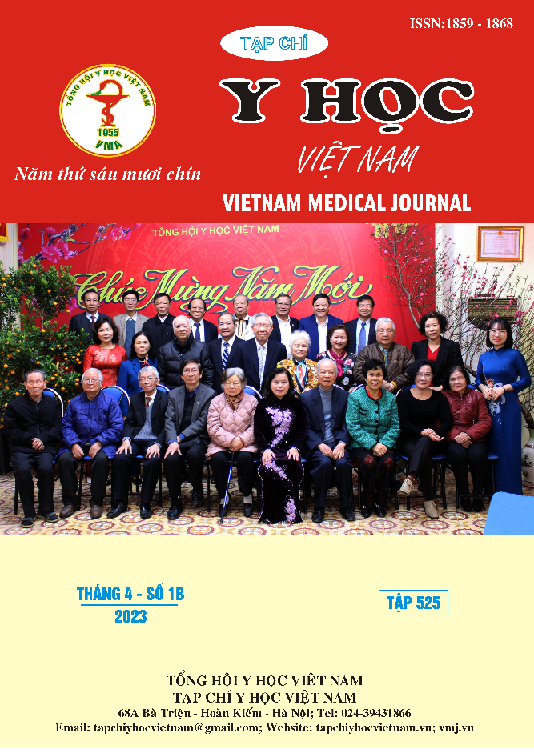RESULTS OF AFATINIB FOR BRAIN METASTASIS IN EGFR MUTATED NON-SMALL CELL LUNG CANCER
Main Article Content
Abstract
Objectives: to evaluate results of afatinib (Giotrif) for brain metastasis in EGFR mutated non-small cell lung cancer. Patients and Methods: A retrospective study, from January 2019 to December 2022, we enrolled 80 EGFR mutated non-small cell lung cancer patients with brain metastasis. All patients were treated afatinib (Giotrif) 150mg/day. We assessed response rate and progression free survival. Results: Clinical characteristics: The proportion of female patients 47.5%; non-smokers 56.3%; 37.5% of patients have neurological symptoms; Patients with poor personal status ECOG ≥ 2 accounted for 11.3%. Brain metastases ≤ 3 foci accounted for 73.7%; whole brain radiation accounted for 23.8%. 36.3% of patients were given the initial dose of 40mg. Exon 19 mutations account for 45%; uncommon mutations account for 26.3%. Efficacy: Overall response rate of brain metastasis was 63,8% and disease control rate was 88,2%. Median of progession free survival was 18,5 months (min: 2,3; max: 42,4) and PFS at 24 month was 46,8%. Progession-free survival of brain metastasis was16,1 months. PFS for brain metastasis at 24 month was 38,9%. Conclusion: Afatinib is an optional treatment for brain metastasis in EGFR mutated non-small cell lung cancer, with hight disease control rate and prolonged progession free survival.
Article Details
Keywords
brain metastasis, non-small cell lung cancer, EGFR mutated, afatinib (Giotrif).
References
2. Sung H., Ferlay J., Siegel R. L. et al (2021), Global Cancer Statistics 2020: GLOBOCAN Estimates of Incidence and Mortality Worldwide for 36 Cancers in 185 Countries, CA Cancer J Clin. 71(3), 209-249.
3. Ballard P., Yates J. W., Yang Z. et al (2016), Preclinical Comparison of Osimertinib with Other EGFR-TKIs in EGFR-Mutant NSCLC Brain Metastases Models, and Early Evidence of Clinical Brain Metastases Activity, Clin Cancer Res. 22(20), 5130-5140.
4. Bộ Y tế (2018), Hướng dẫn chẩn đoán và điều trị ung thư phổi không tế bào nhỏ, Bộ Y tế, chủ biên, Bộ Y tế - Cục quản lý khám chữa bệnh, Hà Nội.
5. Trần Văn Thuấn, Lê Văn Quảng, Nguyễn Tiến Quang (2019), “Ung thư phổi”, Hướng dẫn chẩn đoán và điều trị một số bệnh ung thư, 176-187.
6. Yang J. C., Wu Y. L., Schuler M. et al (2015), Afatinib versus cisplatin-based chemotherapy for EGFR mutation-positive lung adenocarcinoma (LUX-Lung 3 and LUX-Lung 6): analysis of overall survival data from two randomised, phase 3 trials, Lancet Oncol. 16(2), 141-51.
7. Park K., Tan E. H., O'Byrne K. et al (2016), Afatinib versus gefitinib as first-line treatment of patients with EGFR mutation-positive non-small-cell lung cancer (LUX-Lung 7): a phase 2B, open-label, randomised controlled trial, Lancet Oncol. 17(5), 577-89.
8. Su P. L., Wu Y. L., Chang W. Y. et al (2018), Preventing and treating brain metastases with three first-line EGFR-tyrosine kinase inhibitors in patients with EGFR mutation-positive advanced non-small cell lung cancer, Ther Adv Med Oncol. 10, 1758835918797589.
9. Harvey R. D., Adams V. R., Beardslee T. et al (2020), Afatinib for the treatment of EGFR mutation-positive NSCLC: A review of clinical findings, J Oncol Pharm Pract. 26(6), 1461-1474.
10. Paz-Ares L., Tan E. H., O'Byrne K. et al (2017), Afatinib versus gefitinib in patients with EGFR mutation-positive advanced non-small-cell lung cancer: overall survival data from the phase IIb LUX-Lung 7 trial, Ann Oncol. 28(2), 270-277.


